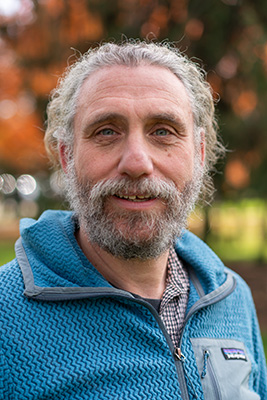Faculty Profile
Michael Beevers
Associate Professor of Environmental Studies (2011)Contact Information
Kaufman Hall
717-254-8036
Bio
Dr. Beevers specializes in global environmental politics with an emphasis on the linkages between natural resources, security, conflict and peace. His work appears in numerous book chapters and journals including Global Governance, International Peacekeeping, African Conflict and Peacebuilding Review and The Extractive Industries and Society, among others. His book, Natural Resource Governance and Peacebuilding in the Aftermath of Armed Conflict: Sierra Leone and Liberia (Palgrave-MacMillan) was published in 2018. He has worked as a research associate at Princeton University and as a consultant for the United Nations Environment Programme and World Resources Institute. He was also a Peace Corps volunteer in Niger.
Education
- B.S., Western Illinois University, 1993
- M.S., M.P.A., University of Washington, 2004
- Ph.D., University of Maryland, 2011
2025-2026 Academic Year
Fall 2025
INST 290 Environment, Conflict & Peace
Cross-listed with ENST 372-01. The goal of this class is to examine the complex relationships between the environment, conflict and peace. We will discuss the emergence of the environment as a topic of conflict and peace studies, and ask if the environment should be a security concern. We will scrutinize the extent to which environmental degradation, resource scarcity, natural resource wealth, and even climate change, increases the likelihood of violent conflict, and discuss the environmental consequences of war itself. We will explore whether environmental cooperation reduces the risk of violent conflicts, and whether responses to environmental problems can serve as catalyst for peace. We will strive to understand how international institutions—governmental, intergovernmental and non-governmental—act to address security and peacebuilding challenges linked to the environment. The course approaches the topic from different levels of analysis (local, national, transnational and supranational), diverse theoretical frameworks and analytical methods and range of environmental issue areas. Finally, we will use a broad range of materials, employ lectures and seminar-like discussions and incorporate field trips and guest speakers.
ENST 372 Environment, Conflict & Peace
Cross-listed with INST 290-03.
ENST 406 Leadership & Social Action
Students will form a deep understanding of the theories, approaches and practices of social change and enhance their understanding of what leadership is, and how it informs organizing and advocacy. Throughout the course, students will explore their passions, values and skills, and how this informs their "leadership style." Students will learn about the tools and skills needed to organize for social change and build organizations. How do you select an issue? How do you develop a strategy and what tactics should you employ to meet your objectives? Students will learn the ins and outs of issue campaigns, community organizing, using new and traditional media, building alliances and engaging communities, understanding the power of story and narratives, and power analysis. Students will learn from leaders and organizers and get hands-on experience putting their ideas for social change into practice. The course will use a variety of readings, discussions, activities, exercises, assignments and projects. It will require that students to interview leaders and develop their own strategy for a sustainable social change they want to initiate.
Spring 2026
ENST 330 Environmental Policy
This course examines the effect of environmental policies on environmental quality, human health and/or the use of natural resources at local, national and international levels. It considers the ways scientific knowledge, economic incentives and social values merge to determine how environmental problems and solutions are defined, how risks are assessed and how and why decisions are made. The course examines a range of tools, processes and patterns inherent in public policy responses and covers issues ranging from air and water pollution and toxic and solid waste management to energy use, climate change and biodiversity protection. A combination of lectures, case studies, and field trips will be used.
Prerequisite: 161 and 162, or permission of instructor.
